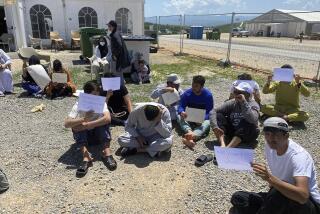So Much to Tell, So Little Time to Tell It
- Share via
KUKES, Albania — Sixty seconds is not much time for a phone call, especially when there is so much to say.
Displaced Kosovo Albanians are lining up by the dozens in refugee camps for free one-minute calls to anywhere in the world. But their allotted time does not allow them to describe how Serbian gunmen burned their villages. Or to detail their long journeys out of Kosovo. Or to relate the overcrowded conditions they now endure.
Instead, their conversations--made possible by special satellite telephones set up in Albania and Macedonia by the International Committee of the Red Cross--sound like this:
“How are you? . . . We are OK. What about you? . . . We are OK. . . . All of us are OK. . . . We are in Kukes in the Arab camp. . . . We wanted to let you know we are OK. . . . Can you come and visit us?”
And this:
“Hello? Hello? Hello? . . . I am in Albania. . . . I’m fine. . . . They’re fine. . . . We are all here together. . . . I have to speak only one minute. . . . All the family is healthy. . . . OK.”
Bland at first blush, the minute-long chats are actually extraordinary. Kosovo expatriates who have been scouring news footage and thinking the worst are learning--one by one, minute by minute--that their families escaped the war-torn Serbian province alive.
“For me, even one minute was enough,” said Firidie Uitfill, 44, a refugee who called her sister-in-law in Germany. “She heard my voice, and I heard her voice. I did not need to tell her everything.”
Hamdi Latifi, 35, a truck driver from Prizren, closed his eyes as he spoke to his brother, who is now living in Switzerland. The last time they communicated was just before March 24, when NATO began its bombing campaign and, Latifi said, his telephone in Kosovo went dead.
“Until now, he didn’t know if I was alive,” Latifi said. “I told him me and 20 members of my family are safe. My heart feels better now. He thought all of us were killed.”
Savvy refugees use their minute to urge relatives to wire money or pick them up in specific spots. But often, as the seconds tick by, there is far more sobbing than speaking.
“I’ve seen them too emotional to talk or so excited that they don’t know what to say and forget to tell where they are,” said Antonio Garcia, a Red Cross relief worker. “They’re making their first telephone call in a month, and a lot has happened in that month.”
Violeta Xhemajli, 25, burst into tears of frustration when she got a recorded message instead of her older sister, Diarete, in Switzerland.
But she returned the following day, waited in line with other camp dwellers and eventually connected. This time, she and her faraway sister sobbed together in joy.
Her sister did not seem concerned with the brevity of the call.
“I thought they were already dead,” Diarete Xhemajli said later in a telephone interview. “I never thought I would hear from my family again. That was the shortest call I’ve ever gotten, but . . .”
Then she started to cry all over again.
More to Read
Sign up for Essential California
The most important California stories and recommendations in your inbox every morning.
You may occasionally receive promotional content from the Los Angeles Times.












